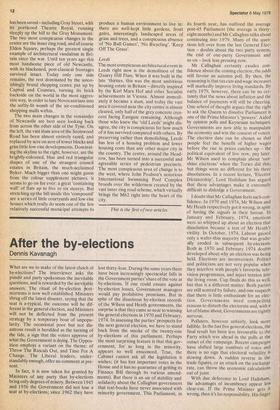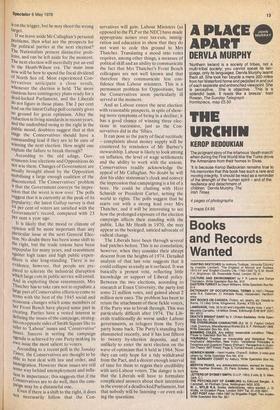After the by-elections
Dennis Kavanagh
What are we to make of the latest clutch of by-elections? The interviewer asks the pundit and party spokesman the inevitable questions, and is rewarded by the inevitable answers. The ritual of by-election ostmortems is now well established. Ministers 'shrug off the latest disaster, saying that the seat is a-typical, the outcome will be different in the general election, and Ministers will not be deflected from the present strategy by a temporary bout of unpopularity. The occasional poor but not disastrous result is heralded as the turning of the tide, a sign that the voters approve of what the Government is doing. The Opposition employs a variant on the theme: of Throw The Rascals Out, and Time For A Change. The Liberal leaders, understandably enough, offer no comment at present.
In fact, it is now taken for granted by Ministers of any party that by-elections bring only degrees of misery. Between 1945 and 1956 the Government did not lose a seat at by-elections; since 1962 they have lost thirty-four. During the same years there have been increasingly spectacular falls in the Government parties' share of the vote at by-elections. If one could ensure against by-election losses, Government managers would pay prohibitive premiums. But in spite of the disastrous by-election records of the Wilson and Heath governments, the surprise is that they came so near to winning the general elections in 1970 and February, 1974. In assessing the parties' prospects for the next general election, we have to stand back from the smoke of the twenty-one by-elections of this parliament. Perhaps the most surprising feature is that this government, for so long in the minority, appears so well ensconced. True, the Cabinet cannot ask all the legislation it wishes; (it has lost important votes in the House and it has no guarantee of getting its Finance Bill through its various amendments). But there is an air of stability and solidarity about the Callaghan government that text-books have never associated with minority government. This Parliament, in
its fourth year, has outlived the average post-45 Parliament (the average is thirtyeight months) and Mr Callaghan talks about continuing into 1979. Many of the questions left over from the last General Election — doubts about the two party system, the end of one-party Government and so on — look less pressing now.
Mr Callaghan certainly exudes confidence about the coming election; the pdds still favour an autumn poll. By then, the reasoning is that tax cuts and wage increases will markedly improve living standards. BY early 1979, however, there can be no certainty that the news about inflation and the balance of payments will still be cheering. One school of thought argues that the right to ask the Queen to dissolve Parliament is one of the Prime Minister's 'powers'. Aided by opinion polls and Keynesian techniques, Governments are now able to manipulate the economy and win the consent of voters. The election date can be chosen so that people feel the benefit of higher wages before the rise in prices catches up — the political equivalent of live now, pay later. Mr Wilson used to complain about 'sunshine elections' when the Tories did this; but things were no different for his three dissolutions. In a recent lecture, 'Elective Dictatorship', Lord Hailsham has argued that these advantages make it extremely difficult to dislodge a Government.
I doubt that Mr Callaghan feels such confidence. In 1970 and 1974, Mr Wilson and Mr Heath respectively got it wrong, in spite of having the signals in their favour. In January and February, 1974, emotions were so whipped up about an election that dissolution became a test of Mr Heath's virility. In October, 1974, Labour gained only a wafer-thin majority that was gradually eroded in subsequent, by-elections. Both in 1970 and February 1974 doubts developed about why an election was being held. Elections are inconvenient. Politics and politicians are not very popular when , they interfere with people's favourite television programmes, and inject tension into the living room. Cup finals do this as well, but that is a different matter. Both parties are still scarred by failure, and one suspects that there is little enthusiasm for an election. Governments need compelling reasons to disturb the electorate and, with a lot of blame about, Governments are rightly nervous.
Pollsters, however unfairly, look more fallible. In the last five general elections, the final result has been less favourable to the Party which was ahead in the polls at the outset of the campaign. Recent campaigns have shifted large numbers of votes and there is no sign that electoral volatility is slowing down. A sudden reverse in the trade figures, or an attack on the exchange rate, can throw the economic calculations out of joint.
With due deference to Lord Hailsham, the advantages of incumbency appear less
clear-cut. If the Prime Minister gets it wrong, then it's his responsibility. His finger is on the trigger, but he may shoot the wrong target.
If we leave aside Mr Callaghan's personal Problems, then what are the prospects for the political parties at the next election? The Nationalists present distinctive problems, and can be left aside for the moment. The next election will mercifully put an end to the Heath-Wilson era. The main issue novv will be how to spend the fiscal dividend of North Sea oil. Most experienced Conservatives anticipate a close result, Whenever the election is held. The more cautious have contingency plans ready for a deadlocked Parliament, and the Liberals do not figure in those plans. The 2 per cent lead on the latest Gallup poll certainly gives no ground for great optimism. After the reduction in living standards in recent years, and the undoubted swing to the right in the Public mood, doubters suggest that at this stage the Conservatives should have a commanding lead if they are to be sure of winning the next election. How might one explain the failure to break through?
According to the old adage, Governments lose elections and Oppositions do not win them. Changes of Government are usually brought about by the Opposition Mobilising a large enough coalition of the discontented. The Conservatives' problem Is that the Government conveys the impression that the worst is now over. The polls suggest that it is currently at the peak of its Popularity; the latest Gallup survey is that 44 Per cent of voters are satisfied with the Government's record, compared with 23 Per cent a year ago.
It is likely that the mood or climate of °Pinion will be more important than any particular issue at the next General Elec tion. No doubt there has been some shift to the right, but the trade unions have been unpopular for many years, and resentment against high taxes and high public expenditure is also long-standing. There is no evidence, however, that people are pre pared to tolerate the industrial disruption Which large cuts in public service will entail. And in exploiting these resentments, Mrs Thatcher has to take care not to repudiate a
large part of Conservative efforts to come to terms with the best. of the 1945 social and
economic changes which some members of her Front Bench have played some part in creating. Parties have a vested interest in
defining the issues of the campaign; strategists on opposite sides of Smith Square like to refer to 'Labour' issues and 'Conservative' Issues, Success in setting the campaign agenda is achieved by one Party making its own issue the most salient to-voters.
.According to a recent poll in the Sunday Tones, the Conservatives are thought to be able to best deal with law and order, and ITIlmigration. However these issues are still 8fte way behind unemployment and infla tion
ku importance; this suggests that if the
`-onservatives are to do well, then the cam. Paign may be a distasteful one. Even if there is a shift to the right, it does not necessarily follow that the Con
servatives will gain. Labour Ministers (as opposed to the PLP or the NEC) have made appropriate noises over tax-cuts, immigration and education to show that they do not want to cede this ground to Mrs Thatcher. Translating a mood into votes requires, among other things, a measure of political skill and an ability to communicate the fact that Mrs Thatcher's Froht Bench colleagues are not well known and that therefore they communicate less confidence than Labour ministers. This is a permanent problem for Oppositions, but the Conservatives seem particularly ill served at the moment.
And so Labour enters the next election with reasonable prospects, in spite of showing more symptoms of being in a decline; it has a good chance of winning three elections in succession, just as the Conservatives did in the 'fifties.
It can pose as the party of fiscal rectitude — complaints about money supply will be countered by reminders of Mr Barber's stewardship. Labour is likely to look strong on inflation, the level of wage settlements and the ability to work with the unions. Conservatives readily acknowledge the appeal of Mr Callaghan. No doubt he will don his elder statesman's cloak and convey the impression that campaigning is a bit of a bore. He could be chatting with Herr Schmidt or President Carter, setting the world to rights. The polls suggest that he starts out with a strong lead over Mrs Thatcher, and it will be interesting to see how the prolonged exposure of the election campaign affects their standing with the public. Like Mr Heath in 1970, she may appear as the besieged, untried advocate of radical change.
The Liberals have been through several bad patches before. This is no consolation, however, when they consider their abrupt descent from the heights of 1974. Detailed analysis of that last vote suggests that it could collapse as easily as it surfaced. It was basically a protest vote, reflecting little knowledge or support of Liberal policy.
Between the two elections, according to research at Essex University, the party lost some 2i million votes, and gained about 2 million new ones. The problem has been to retain the attachment of these fickle voters, if the Party was to break through. This was particularly difficult after 1974. The Liberals traditionally do worse under Labour governments, as refugees from the Tory party home back. The Party's standing has plummeted recently, and it has lost fifteen to twenty by-election deposits, and is unlikely to enter the next election on the wave of optimism that it held in 1964. Now they can only hope for a tidy withdrawal from the Pact, and a decent enough interval of time for them to regain their credibility with anti-Labour voters. The danger is not that the Liberals will have to formulate complicated answers about their intentions in the event of a deadlocked Parliament, but that nobody will be listening —or even asking the questions.







































 Previous page
Previous page